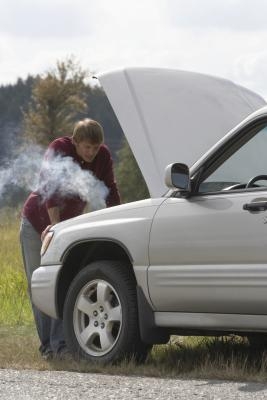
Vehicles overheat for a variety of reasons, not all of them linked specifically with the temperature outside. While it is far more likely for a car to overheat in the summer as opposed to the winter, a poorly functioning engine can overheat regardless of the outside temperature. Some estimates indicate that as many as 80% of vehicle mechanical breakdowns are caused by the failure of the engine cooling system. The BMW 318i, while a top notch car in many respects, still falls victim to the problem of overheating when the coolant system of the car is not properly cared for.
Problems with the engine cooling system can sometimes be traced to a leak in the car's radiator. There are a variety of causes for leaks in the radiator. Being for the most part exposed to rocks and debris from the road, it is possible that something might have hit the radiator cooling tubes hard enough to break them or crack them. Minor front end collisions tend to damage the car's radiator but may not be repaired unless the problem is immediately identified. Corrosion is another problem area for radiators which aren't properly maintained. While the aluminum fins won't rust, aluminum and copper do corrode when exposed to the right conditions, most of which are a combination of a lack of proper maintenance coupled with poor road conditions like excess salt.
Coolant leaks are surprisingly common on many of today's cars. This isn't necessarily due to negligence on the part of the vehicle owner, but may be caused by a number of different factors. Over time, the engine of a car will warp under the stress of driving. While this isn't a problem if the engine is never disassembled, it does become a problem if the head gasket ever needs replaced. In these cases, the head/gasket/block mating surface can never be returned to its original shape, so the engine will slowly leak fluid from the engine's repair point. As many BMWs are driven to extremely high mileage, some to 300,000 miles or more, coolant leaks become more and more prevalent as the years pass and more parts of the engine are replaced or repaired. Other sources of coolant leaks might be a cracked engine block or cracked radiator hoses.
Coolant flow blockage can account for many overheating problems in cars. Because the coolant system is so seldom serviced -- every 30,000 miles in most cars -- rust and sludge deposits can build up in critical engine coolant ducts over time. Even skipping a single service interval can prove disastrous to the cooling system of a car, allowing the rust deposits to build up to the point that the coolant no longer flows into the engine at all, at which time catastrophic engine failure can ensue. Regardless of how well-engineered your car is, failure to maintain it will shorten its useful life dramatically.
A malfunctioning engine cooling fan or water pump could easily be the cause of overheating problems in your car, particularly in high-mileage engines. Water pumps have a service life of several years, but like any mechanical pump, they are subject to the wear and tear of daily use. The water pump itself can be subject to overheating; if coolant flow is blocked or restricted on the upstream side of the pump, not allowing coolant into the pump at all. This can happen if the radiator itself is clogged with rust and sludge deposits. Mechanical and electric cooling fans are both prone to failure. While you won't notice the overheating problem while the car is in motion because air is circulating through the radiator, when stopped or moving slowly in traffic, the engine will overheat because there is no cool air being drawn over the radiator's cooling fins.